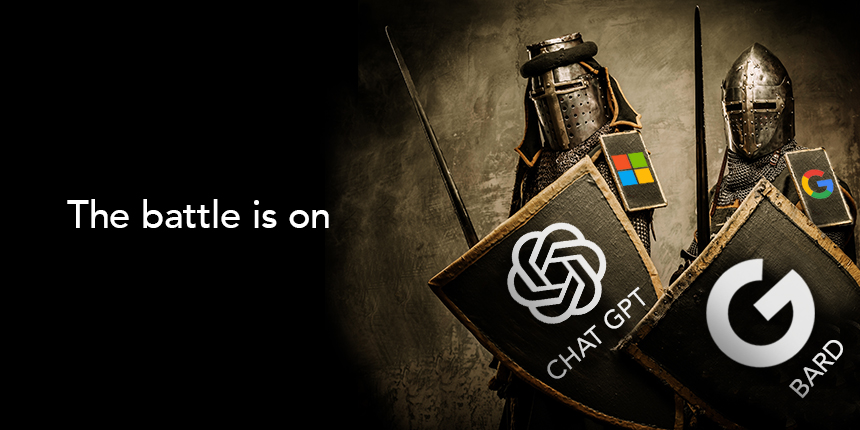The battle for AI supremacy is officially on between Microsoft and Google. The excitement around AI (Artificial Intelligence) has reach fever pitch in the last 60 days or so. It’s gone from one or two weekly posts on specialised blogs to multiple new daily articles, opinions, and hot takes about AI, not to mention actual new information and announcements by Microsoft, Google, and other players in the AI space.
After teasing a “new” Bing in the last week or two, Microsoft finally gave us the full news release and a special live event in Seattle about the integration of ChatGPT in future iterations of Bing, Edge, Azure, and other Microsoft products. The demo and details from Microsoft weren’t only impressive, but a shot across Google’s bow—prompting the search giant to respond with its own announcement about its own AI initiative, Bard. As the New York Times reported, OpenAI’s launch of ChatpGPT and Microsoft’s subsequent investment caused a “code red” at Google.
Microsoft wants to reinvent search
Microsoft says that its goal is to reinvent search into one “unified experience”, and points to the fact that search has been stagnant for years. In fact, according to Microsoft, more than half of the 10 billion searches conducted each day go unanswered. Its plan is to integrate AI as a “copilot” for the web via new versions of Bing and Edge.
- Next-generation open AI model ChatGPT 3.5 will power the new Bing
- Announcement of Microsoft Prometheus Model; a new way of working with the OpenAI model
- Applying AI to its Core Search Algorithm
- Brand new UX for Edge/Bing
Microsoft showed several examples—including creating a menu for an anniversary and building a trip itinerary—to illustrate how search, browsing, and chat can be combined into a seamless user experience on the web.
Should Google be worried?
Right now, yes, and here is why.
- In order to test the new Bing, you can sign up to the wait list here. If you set Edge as your default browser and install the Bing app, you will be moved up the wait list. It’s a smart way to start counteracting Google Chrome and Google Search’s dominance of the browser and search markets respectively.
- Google seems to have been caught off-guard and is scrambling internally to get something out. Right now, Microsoft is still ahead of Google with what seems to be a better product, although it still needs some improvements and is not yet fully live.
In short, Microsoft got the first good punch in but the ball is in Google’s court now. The fight for AI supremacy is on.
Time to pump the AI brakes
AI is a fast-evolving field and it’s hard to keep up, particular in terms of legislation. As Dr. Ian Malcolm put it in Jurassic Park: “Your scientists were so preoccupied with whether they could, that they didn’t stop to think if they should.”

Getty images just filed a lawsuit for copyright infringement regarding AI-generated images. Having previously admitted using AI to generate content, CNET (and other outlets) is now having to revise and issue corrections as the content was not 100% accurate. It has actually stopped publishing AI content altogether for the time being.
In January, New York City’s public school system announced it is trying to combat students from cheating on term papers. In response, OpenAI released a tool just within the last couple of weeks to determine if a block of text was written by AI. We tested this earlier this week with mixed results. We generated a paragraph of text in ChatGPT, didn’t make any edits, and used the OpenAI Text Classifier. The verdict? “Unlikely written by AI.”
The use of watermarks for chatbots is being developed to combat plagiarism issues. Additionally, Microsoft stressed in its announcement yesterday that it was working with OpenAI “responsibly” and implementing safeguards to combat against dangerous or harmful content that promotes misinformation.
For the SEO industry, technological advances that intend to improve search are usually a good thing. However, AI in its current guise is nothing like Iron Man’s J.A.R.V.I.S. Human intervention is still needed to review content, tweak output, fact-check, and more. AI right now should be considered a tool rather than a fully formed entity that could replace entire industries.
Immediate efficiencies offered by AI
- Helping troubleshoot code issues, or even generating code blocks like schema mark-up
- Generating keyword topics and keyword clusters (the era of really long-tail keywords is upon us!)
- Creating lists of potential blog topics
- Generating small sections of text for a page
- Helping to generate meta descriptions and page titles
- Creating Excel formulas and other data calculations, such as VLOOKUP
The pace of change in just the last 30-to-60 days has been dizzying, but don’t expect that pace to let up anytime soon. Instead, expect 2023 to be an fascinating year for technological advances—hopefully for the better.




